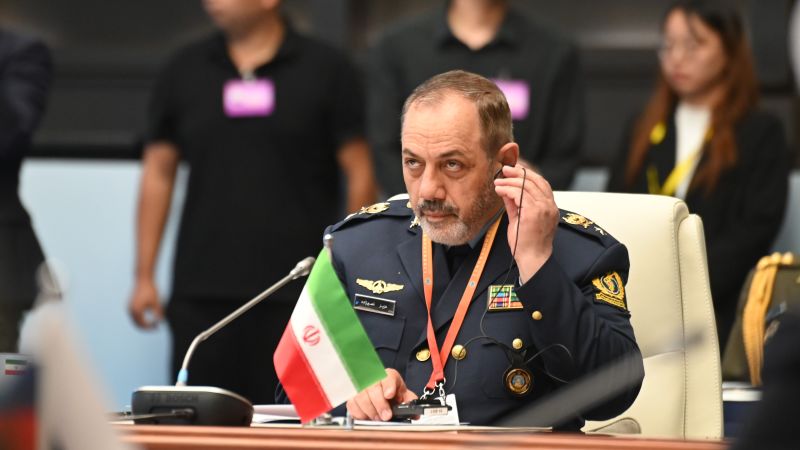Iran’s defense minister has traveled to diplomatic and economic ally China on his first reported trip abroad since a12-day clash with Israelthat briefly dragged the US into a new regional conflict.
Aziz Nasirzadeh is one of nine defense ministers that Chinese state media say attended a gathering of theShanghai Cooperation Organization (SCO), a China- and Russia-led regional security grouping that has grown in prominence as Beijing and Moscow look to build alternative international blocs to those backed by the United States.
The two-day gathering began Wednesday in the Chinese coastal city of Qingdao, a day after a ceasefire between Iran and Israel quelled what had been days of aerial assaults between the two, punctuated by a US strike onthree Iranian nuclear facilities.
The SCO gathering coincided with ameeting of NATO leadersat The Hague, where US President Donald Trump said the US would meet with Iran “next week” about a potential nuclear agreement.
Beijing’s gathering, part of events for its rotating SCO chairmanship, spotlighted China’s role as a key international player, even as it remained largely on the sidelines of the Israel-Iran conflict – and the importance Tehran places on its relationship with Beijing.
Chinese Defense Minister Dong Jun did not directly address the conflict in remarks to gathering nations Wednesday, as reported by Chinese state media, but aimed to position China as a country with an alternative vision for global security.
“Unilateralism and protectionism are surging, while hegemonic, high-handed, and bullying acts severely undermine the international order, making these practices the biggest sources of chaos and harm,” Dong said, employing language typically used by Beijing to criticize the US.
The Chinese defense chief called for SCO countries – which, in addition to China and Russia, include India, Iran, Pakistan, Kazakhstan, Kyrgyzstan, Tajikistan, Uzbekistan and Belarus – to enhance coordination and “defend international fairness and justice” and “uphold global strategic stability.”
Attending countries “expressed a strong willingness to consolidate and develop military collaboration,”according toChina’s official news agency Xinhua.
Iran’s Nasirzadeh “expressed gratitude to China for its understanding and support of Iran’s legitimate stance,” Xinhua also reported.
The minister “hopes that China will continue to uphold justice and play an even greater role in maintaining the current ceasefire and easing regional tensions,” he was quoted as saying.
Chinese officials havecondemned Israel’s unprecedented June 13 attackon Iran, whichtook out top military leadersand sparked the recent conflict, as well as the subsequent US bombing. It’s also backed a ceasefire and criticized Washington’s foray into the conflict as a “heavy blow to the international nuclear non-proliferation regime.”
A key diplomatic and economic backer of Iran, Beijing has moved to further deepen collaboration in recent years, including holdingjoint naval drills.Chinese officials havelong voiced opposition to US sanctions on Iranand criticized the US withdrawal from the 2015 Iran nuclear deal.
China remains by far Iran’s largest energy buyer, though it has not reported purchases of Iranian oil in its official customs data since 2022, according to analysts. Chinese-made chemicals needed to produce missile fuel have been delivered to Iran in recent months,CNN reporting shows.
In recent days, China has appeared unwilling to becomefurther entangledin the conflict past its diplomatic efforts, analysts say, instead using the situation as another opportunity to paint itself as a responsible global player and the US as a force for instability.
Founded in 2001 by China, Russia, Kazakhstan, Kyrgyzstan, Tajikistan and Uzbekistan to combat terrorism and promote border security, the SCO has grown in recent years in line with Beijing and Moscow’s shared ambition to push back against a US alliance system they see as suppressing them.
While not an alliance, the group says it aims to “make joint efforts to maintain and ensure peace, security and stability in the region.”
The SCO has long been seen as limited, however, by overlapping interests and frictions between members, including Pakistan and India, which earlier this yearengaged in a violent conflict, as well as China and India, which have longstanding border tensions.
Indian Defense Minister Rajnath Singh also attended the Qingdao meeting, the first visit from an Indian defense chief to China since a deadly 2020 border clash between the two countries.
CNN’s New Delhi bureau contributed to this report.
